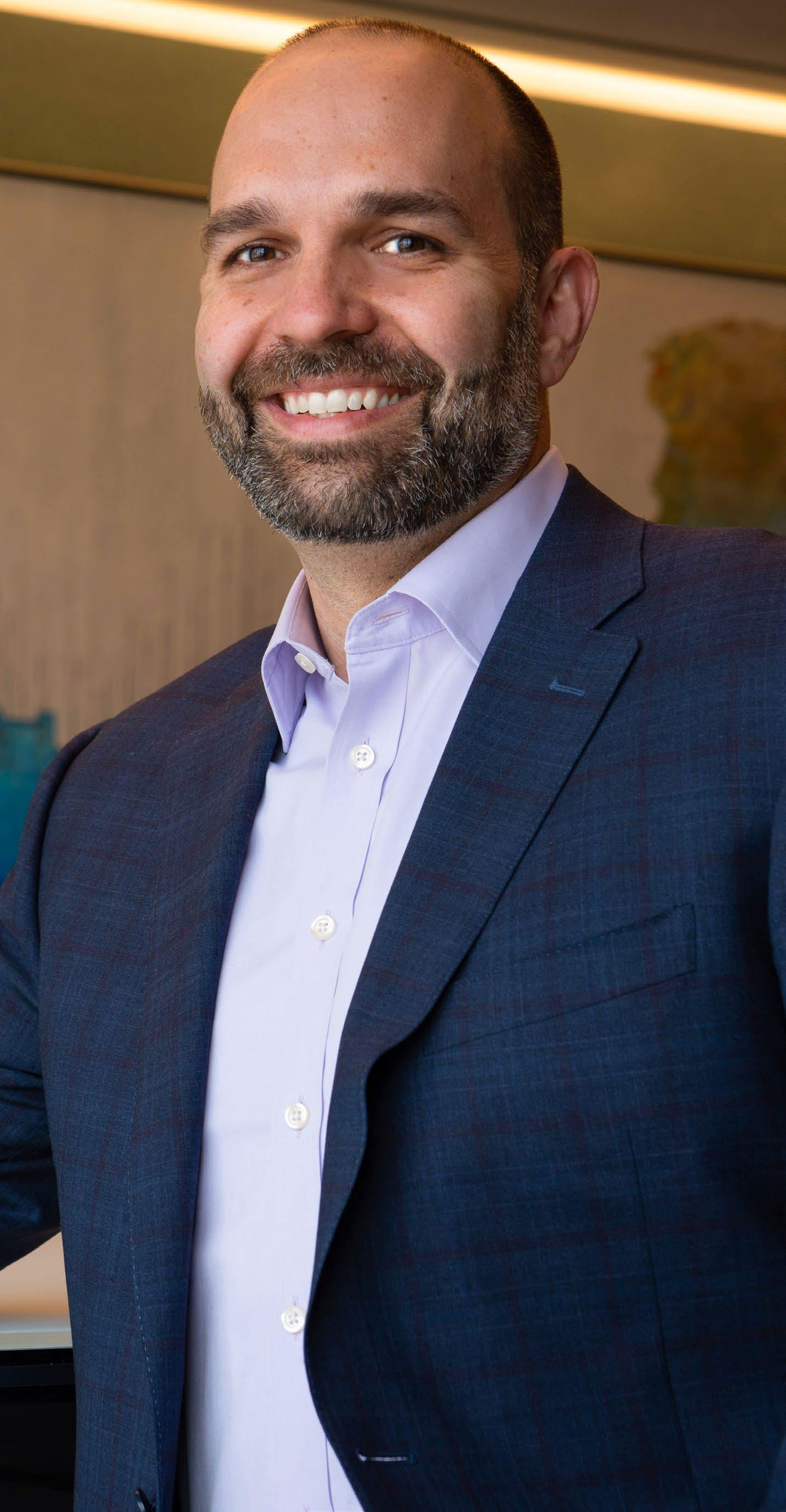
10 minute read
LeGeyt brings Hill savvy to his new role
W
hen Gordon Smith drops the mic at the end of December, Curtis LeGeyt will be there to pick it up. The chief operating officer of the National Association of Broadcasters will assume the role of president and CEO on Jan. 1, 2022. Smith will transition to an “advisory and advocacy role.”
LeGeyt — pronouned “LUH-jet” — is an experienced lobbyist with a background in Democratic politics; but he has been with the NAB since 2011, including five years as executive VP of government relations, a key lobbying post at the association.
Radio World Editor in Chief Paul McLane interviewed LeGeyt in June via video conference.
Writer
Paul
McLane
Editor in Chief
Radio World
Define the purpose of the NAB, its central mission.
Curtis LeGeyt: More than anything, our mission is to ensure that our members, both radio and television, can continue to serve communities across this country with a vibrant but viable means of communication, with locally focused content, in a time of tremendous media disruption.
For broadcast radio in particular, the competitive threats — between streaming, what’s going on in the dashboard, what’s going on with smart speakers — have never been more pronounced. But radio, it has been demonstrated throughout the pandemic, has never been more important.
NAB is ensuring that that medium is going to be able to continue to thrive amidst all of this disruption in the marketplace and also, frankly, disruption in Washington.
Leaders of NAB have had their public personas — Eddie Fritts, the classic effective lobbyist; David Rehr, who was “elbows and knees” in Washington. Gordon Smith is known as a pragmatist — “working quietly behind the scenes” would be his public persona. What can we expect from you?
LeGeyt: I think the public persona is very much one of continuing that leadership style that has been a hallmark of Gordon’s success.
We going to know the issues that matter to our membership better than anyone else. We are going to continue to stay on the ground, get outside of Washington and ensure that we understand how what’s happening in Washington is impacting our radio members’ businesses — ensuring that we’re not fighting yesterday’s fights tomorrow but we’ve got our pulse on what’s going on in the industry.
My leadership style is one of inclusiveness, wanting to hear opposing viewpoints, wanting to get a sense of what matters — in terms of our advocacy, our focus in our technology initiatives, our programming. Laying out a transparent game plan as to what we view as the industry’s challenges and how we’re going to execute on real-world solutions.
Is it a coincidence that the Republican is leaving the job, and a Democrat — you having come up with Patrick Leahy and working on the Obama campaign years ago — how important is it that the new U.S. president is a Democrat and the leader at NAB is a Democrat?
LeGeyt: I don’t think it’s that important. What I mean is, we are a bipartisan organization in our DNA. We work with members on both sides of the aisle.
About LeGeyt
Curtis LeGeyt received his J.D. from Cornell University Law School and his B.A. in quantitative economics from Providence College. He began his career as a management consultant for Putnam Associates and worked on the staff of the 2008 Obama For America presidential campaign.
He is a former associate at Howrey LLP, a law firm in Washington, where he worked on antitrust litigation and merger reviews.
Before NAB, LeGeyt was senior counsel to then-Senate Judiciary Chairman Patrick Leahy of Vermont, advising Leahy and the committee on intellectual property, antitrust and First Amendment issues.
As chief operating officer of NAB, LeGeyt is involved in all aspects of the association’s work. He was executive vice president of government relations before being named to his current position in 2020. He is also general counsel for the NAB Leadership Foundation.
NAB said that during his tenure he has led successful efforts including permanent reauthorization of the Satellite Television Extension and Localism Act Reauthorization, inclusion of $1 billion in RAY BAUM’s Act to reimburse stations affected by the spectrum auction repack, and successful passage of the Music Modernization Act.
LeGeyt is on the boards of Tracy’s Kids, a nonprofit helping children with cancer, and Musicians On Call, an organization that uses music to help at children’s hospitals and elsewhere. He is an alum of Leadership Music, a Nashville-based program that fosters community and collaboration among music industry leaders.
He lives in Alexandria, Va., with his wife Kacey and their three children.
We rely on those members of Congress who, because of their experience in their home districts, understand the importance of local radio.
On any number of the legislative initiatives where we’ve been successful over the course of the last few years — whether it was COVID-19 enhanced relief for local broadcasters, the performance tax, beating back a change in the business advertising deduction on Capitol Hill — we have been successful because we’ve had bipartisan support from both the Chuck Schumers of the world and the Mitch McConnells of the world.
The hallmark is the ability to work across the aisle. Gordon certainly had that when he was in the Senate, and he carried over that skill set.
And if you can’t stop something, you’re going to want to shape it; and in order to shape it, you’re going to need to work with legislators. That’s a bipartisan approach that we take at NAB.
We’ve got champions on both sides of the aisle, because there are local broadcasters that both Republicans and Democrats want to fight for.
And yet the Hill has never been so bifurcated, at least from a public perception, everybody yelling at everybody else. You’ve worked there as a lawyer and a lobbyist, you’ve seen it up close. So how do you get anything done?
LeGeyt: That is the real challenge for us right now.
We did our annual fly-in — where we normally get 500 local radio and television station GMs in town — we did it virtually this year because of COVID. That was a big theme as we prepared our members for meetings on Capitol Hill: to not get caught up in the divisiveness. It’s so easy to get swept up in the politics and everything that’s going on up there.
There’s no question it is a very, very divided landscape. But for us, the issues our industry needs help on are too important to get caught up in that partisanship. We’re going to need champions on both sides of the aisle.
So we’re reminding folks of the role that local radio is playing. “Hey, businesses were closing, schools were closing; where were these members’ constituents relying when they needed up-to-the-minute information on how they were going to navigate through this pandemic?”
It was local radio. Vaccine education. “Where am I going? What are the safety concerns?”
There’s all this distrust right now of the social media platforms, of the very politicized cable news outlets. Where can you rely? It’s local radio.
Yeah, you’ve got to frame it a little bit differently depending on whether you’re talking to a Democrat or a Republican, there’s obvious reasons for that; but I think once you get below the surface, that core understanding of the trust communities have in radio is bipartisan.

Looking at NAB’s goals on the Hill, what are you advocating for or working on next?
LeGeyt: Our focus is on ensuring that this industry can reemerge from this pandemic as strong, if not stronger, than going in. [Also] there’s so much focus right now on Capitol Hill on the role of the tech platforms in undermining public trust, the degree of power that these platforms have as gatekeepers to every type of media. That’s very important for local radio.
When you think about how radio is being accessed — whether it’s through streaming platforms on the dashboard, smart speakers, online — these platforms have major gatekeeping roles. [Given] all the content that our members are investing in that sits alongside their traditional streams, our success is at the behest of these platforms.
Members of Congress understand that. There’s a concerted effort to do something, especially as it relates to local journalism and local news. I would pay attention to the conversation that’s taking place in the House Judiciary Committee, the Journalism Competition and Preservation Act in particular, where there’s a real focus on ensuring that local media can compete on a level playing field, negotiate on a level playing field for fair terms when our programming is being used. We want to ensure that policymakers understand that radio is a part of this conversation.
The second piece is that we need to ensure radio doesn’t end up saddled with new costs as a result of some action that Congress or the FCC takes. This is not the moment for increased costs of doing the same business.
I do think you’re going to see a reinvigoration around the performance tax discussion.
We’ve already seen that MusicFIRST, the record labels’ advocacy machine, has hired a new spokesperson, a former member of Democratic congressional leadership, Joe Crawley, to spearhead their efforts this Congress. It puts the onus on us to ensure that the support we have in opposing any new royalty on local broadcasters continues to be affirmed through support of the Local Radio Freedom Act in a way that says to the House Judiciary Committee, “Yes, the other side is invigorated in their advocacy; but there’s such a disproportionate amount of support for local radio in this fight, it’s not something you ought to use bandwidth on.”
The third is again to the costs element. [With] everything that is happening in localities around the country with regard to local ad taxes, in Washington
there’s going to be, I think, a real focus on how you generate funds to pay for what President Biden and Congress want to do on infrastructure. We’ve got to ensure that there are no changes to the advertising deduction or any new ad taxes that are going to disincentive businesses from advertising on local radio.
Broadcasters obviously had a lot of interest in what the Supreme Court did in the Prometheus/ FCC case. What are your thoughts about the impact in the marketplace now that the rule change has been upheld?
LeGeyt: I think clarity is important here. For the last 20 years we’ve been living in this seesaw — an FCC that goes in one direction, and the Third Circuit throws its decision back in its face. Having certainty as to the rules of the road for local radio ownership will probably lead to some additional scale in certain markets in a way that I think is just necessary in this time and place to compete with these tech platforms that have unbridled ability to offer both a nationwide and also a very locally focused advertising product. I think it will have some impact there. I also think, though, that the certainty will help lead to more investment in localism. You think we’ll see the FCC lift those ownership subcaps per market? LeGeyt: I hope so, because for certain of our members, it is needed. The competitive landscape is so different now than it was two decades ago. The idea that the type of scale we’re asking for would even give regulators pause relative to what’s happening with our tech competitors — it just seems very antiquated. At the same time, we need to be cognizant that in a Democratic FCC, even those commissioners who over the “I’ve been awed that at a time where our industry has been under the most financial stress, we’ve actually done our best work. ” years have been very supportive of local broadcasting have had significant pause when it comes to consolidation and what that might mean for our ability to serve our communities. There’s a different philosophical underpinning, but that’s a conversation we’re going to continue to have at the FCC.
What is your read on how the acting chairwoman is doing in that role?
LeGeyt: I think she’s doing very well in that role. One thing you’re seeing from her is finding those areas where she can get unanimity and support from the Republican commissioners, and acting on them. That is a wise








